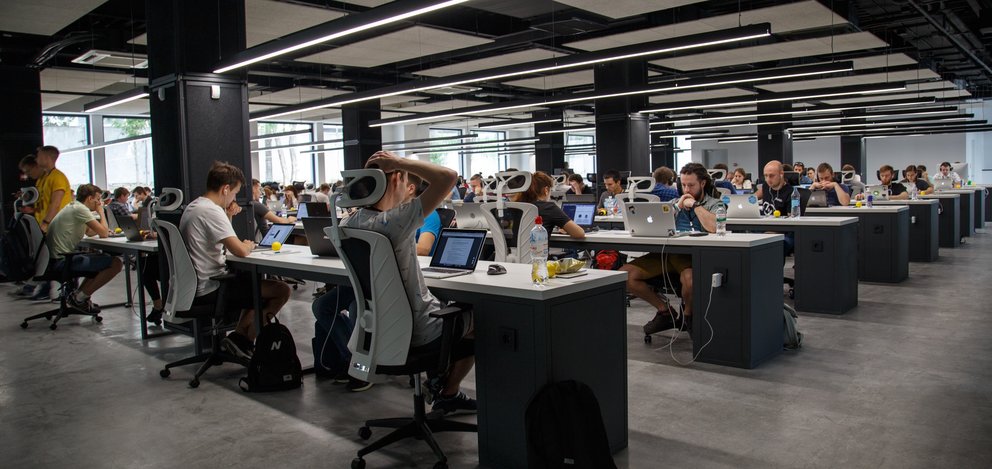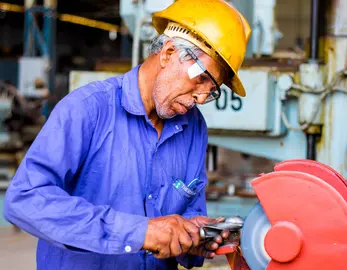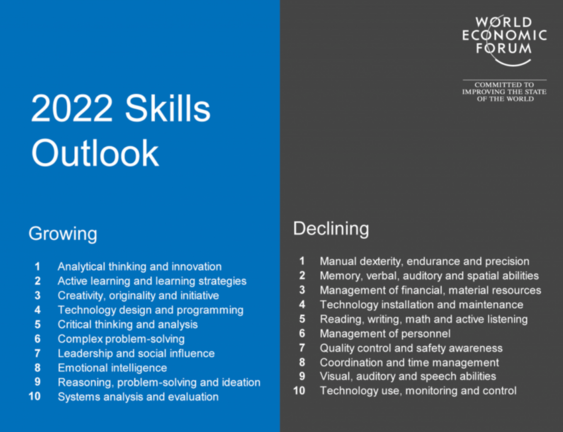The fourth industrial revolution is creating unforeseen opportunities for people, communities and for business, driven largely by rapid developments in technology. Aside from the technological aspect, other mega trends such as climate change, demographics, and globalization at unprecedented paces are altering the nature of work, the kinds of jobs businesses need, and tasks performed. To thrive in this era, global thought-leaders such as the OECD, the UN and the World Economic Forum, along with the ILO are promoting lifelong learning as a way to ensure that “no one is left behind”.
Research by these organizations and numerous others underline the positive multiplier effect that lifelong learning has on business, communities, and individuals. More recently, the ILO’s Global Commission on the Future of Work proposed a universal entitlement to lifelong learning in its report, as its first recommendation. To achieve this recommendation and make lifelong learning a reality for all segments of society, business, government, policy makers, and individuals must all play a role. One key question is, how do we finance lifelong learning?
In our search for an answer to this question, GAN organized a virtual panel discussion with a few key thought-leaders who are at the heart of transformative change in our labour markets. Bettina Schaller, Head of Global Public Affairs, The Adecco Group, moderated the discussion between:
-
· Priscila Chaves Martinez, Co-founder and Director, Innova10x
-
· Natacha Juda, Director, Inter-professional Council for Training, State of Geneva, Switzerland
-
· Kathryn Porter, Director of Youth Strategy for Europe, Middle East and Africa (EMEA), Hilton
-
· Takaaki Kizu, Skills and Development Officer, Skills and Employability branch, ILO
These individuals are dealing head on with how to connect people and business with the 21st century skills we need to thrive, especially in an age where technology, demographics, globalization and climate change are impacting the composition of workforces, and the nature of skills that are needed. This discussion particularly explores funding models for lifelong learning, employed by companies and government and delves into the definition and concepts surrounding lifelong learning. Stay tuned for the release of the second part of this article which will focus on the challenges and solutions to enable lifelong learning and the role that business, government, policymakers and individuals can play.
“We need to replenish skills throughout a working career, and this calls for revisiting the models and concepts of lifelong learning to create the future we want.” – Guy Ryder, ILO Director-General
Question:
What is your definition of lifelong learning? Does your company/organization adopt an official definition of lifelong learning?
Natacha Juda:
For me, my definition is quite broad, it encompasses all learning activities that are for both personal and professional development, whether informal or formal. Lifelong learning applies to all individuals, and encompasses initial education and training, as well as continuing education and training.
Priscila Chaves:
We cannot separate the concept of lifelong learning from the discussion around the Future of Work. Lifelong learning is a tool to help us progress on reskilling oneself. It’s no longer an option, it’s mandatory to help us navigate what is inevitably happening in the world of work and the shift to a gig based economy, where different kinds of jobs will be created, due to automation.
Kathryn Porter:
We are in the midst of labelling something that has existed already for a long time. Lifelong learning has been around long before 2006 when the initial debate around this topic arose. What is interesting now, is the fact that we want to label it, which means that we want to structure and shape it. This is increasingly important in the age of AI and automation. In all discussions around lifelong learning, the Future of Work is a driver. In this new environment, we have more gig and cloud workers, freelancers and contractors which changes how we work.
Lifelong learning needs to be structured in this particular environment, and should meet the demands of what people want, and the needs of the future. With the growth of the gig economy, the fastest growing sector online will be education. This is very telling about the growth of the informal learning nature of lifelong learning. This leads us to another topic on digital accreditation, which we can have another discussion on.
Takaaki Kizu:
One of the first elements of our Future of Work report is lifelong learning and it is a priority within the ILO. A working definition was developed in 2006 similar to the definition that Natacha refers to; however, there is also a diverse understanding of its scope, such as whether or not, the program should prioritise a market aspect or if it should encompass both formal and informal learning. We are aware that there is no universal definition, and this is a topic of much debate at the ILO.
Question:
Is adult learning a synonym of lifelong learning? This differentiation has been part of the ILO’s evolution in the definition since 2006, in terms of extending its scope.
Takaaki Kizu:
Lifelong learning is not only about adults because if you think about learning throughout ones life it can start as early as childhood. I believe that adult learning is really a subset of lifelong learning but one that is particularly important in discussions about the future of work.
Question:
What are the goals of lifelong learning? If you could only choose one, which would it be?
Natacha Juda:
As lifelong learning is such a broad area, it should incorporate inclusiveness. There is a political consensus with all stakeholders that 95% of 25 year olds in Switzerland should have upper secondary certification. A solid initial education and lifelong learning are considered key factors to get into the labour market and keep their jobs as adults in a fast changing economy. Lifelong learning serves a social purpose that should not be overlooked as it improves quality of life.
Takaaki Kizu:
Lifelong learning should support the development of people’s capabilities and should go beyond only a focus on employability. The Future of Work notion goes beyond market capabilities and extends to improving your well-being, by shifting from a human capital approach to one that speaks of capabilities. Employability is what traditionally the ILO has supported however, the Global Commission challenges this notion by asking essential questions such as, what it means to work and how to participate in the workforce? What does it mean to have satisfactory work?
Lifelong learning: Concepts, issues and actions (Source: ILO)
Kathryn Porter:
Lifelong learning should be essential to evolve human behaviour, capital and skills to meet the needs of future workforces.
Priscila Chaves:
Lifelong learning should create a mindset around owning your own development journey. Society needs to understand that lifelong learning will not happen on its own, it’s a participatory process where the individual can take ownership.
Question:
What is the thinking right now around funding models? And why should that model be applied? As an employer, we at The Adecco Group as an example, support the notion of individual learning accounts.
Takaaki Kizu:
Funding and governance should be a shared responsibility between educational institutions, governments, workers and employers. We have seen lately the shift moving towards individuals taking on more responsibility in their career development. So at the ILO, we are looking at how to support individuals seeking lifelong learning opportunities.
We see innovative approaches happening in France, the Netherlands, Singapore and the Nordic countries with individual learning accounts. For example, in France all active workers receive a credit of up to 500 EUR/year with a lifetime ceiling of 5000 EUR. For lower qualified workers, the amount is 800 EUR/year with a lifetime celing of 8000 EUR.
In Singapore, there are skills credits, however there is a minimal age requirement of 25 years old, with individual accounts worth up to 350 USD grants, with the government topping off. In the Netherlands, they are ambitiously extending the accounts for everyone, by this year, whether young, old, active or inactive in the workforce. Overall, in what we have observed, there seems to be trade-offs between scope (who benefits), the types of activities that are supported and the amounts and source of funds available for learning.
Priscila Chaves:
In Central America, it is better to decentralize as opposed to centralize everything under one model. In our region, we have several innovative models emerging. One example is commercial incentives where retailers are linking products, with an opportunity to learn a new skill. This is creating an interesting dynamic in the market where people are learning new skills with a product. Employers are also creating academies that are open to the public and where businesses can recruit students based on performance so employers are able to access the skills needed, while the participants are learning new skills.
We have other initiatives where people can take part in competitions to create solutions for business while at the same time, learning a new skill while further developing their ideas. The use of equity crowd funding platforms and angel investing is becoming an increasingly popular concept which can help to engage communities and society in participating and funding programs for populations most affected by technology shifts. These are considered micro investment funds so people can each pitch in. The idea is to fund your own educational needs and when it is time to pay back the angel investor, it is actually much cheaper than taking on student debt.
Natacha Juda:
In Geneva, we utilize a mix of supply-based and demand based funding. Traditionally, the state subsidizes institutions that offer programs for adults, however subsidies to providers does not guarantee equal access for everyone. So since 2001, the canton of Geneva offers a voucher for education and training for up to 500-750 CHF to adults. It covers a wide breadth of the population but it is limited to those who are considered to earn low or average incomes. The main conditions are that training must be carried out with quality providers and it must yield a professional benefit. We are the only state in all of Switzerland to have this model in place for almost twenty years, with interesting results.
Kathryn Porter:
Funding is directly dependent on whether or not the lifelong learning program offers a certification. There is a massive amount of informal learning that is low-cost, yet yields a significant opportunity. In the UK, we’ve used individual learning accounts but this hasn’t worked with parameters and requirement that are too strict and specific. To do this better for the future, we need to take a second look at what those parameters and requirements should entail, especially in the context of the Future of Work.
In other countries, such as South Africa and here in the UK, we see levies on large employers, where part of the tax can then be redistributed to cover costs for skilling and reskilling opportunities. Another example is the ability for large employers to extend some of these training benefits to SMEs in their supply chain.
We invite readers of this thought-piece to join the conversation. Share your ideas, recommendations and experiences on lifelong learning with a global audience, and stay tuned for Part II of this conversation on challenges, lessons learnt and the role of government, business and individuals for funding lifelong learning.
About the SkillingNow campaign
The Campaign SkillingNow is a global platform launched by GAN, with Accenture’s support, to deep-dive into a selection of pressing topics linked with work-based learning that are essential for bridging the skills gap, and creating a skilled workforce for the future of work. Throughout 2019, we will work with our members, networks, partners and thought-leaders around the world to explore each topic and engage with broader audiences through thought pieces, podcasts, Twitter Summits, Instagram, and more.








